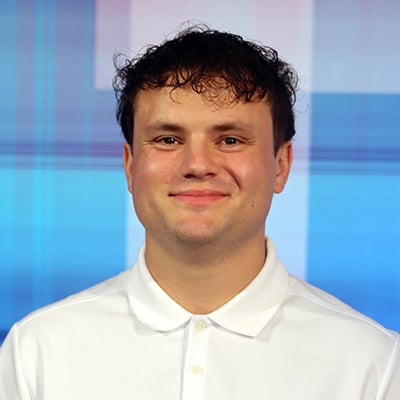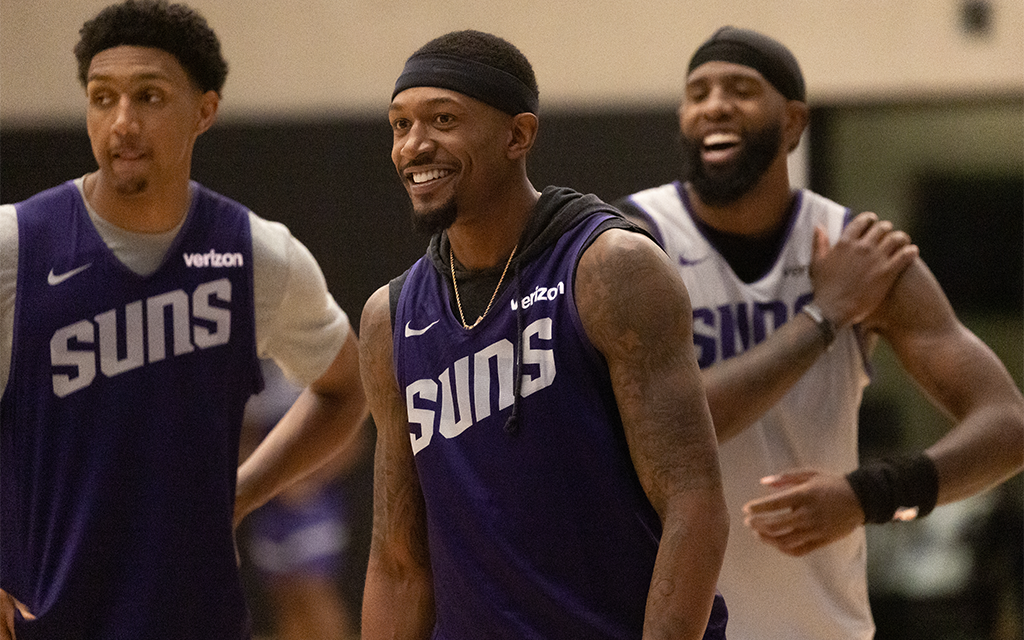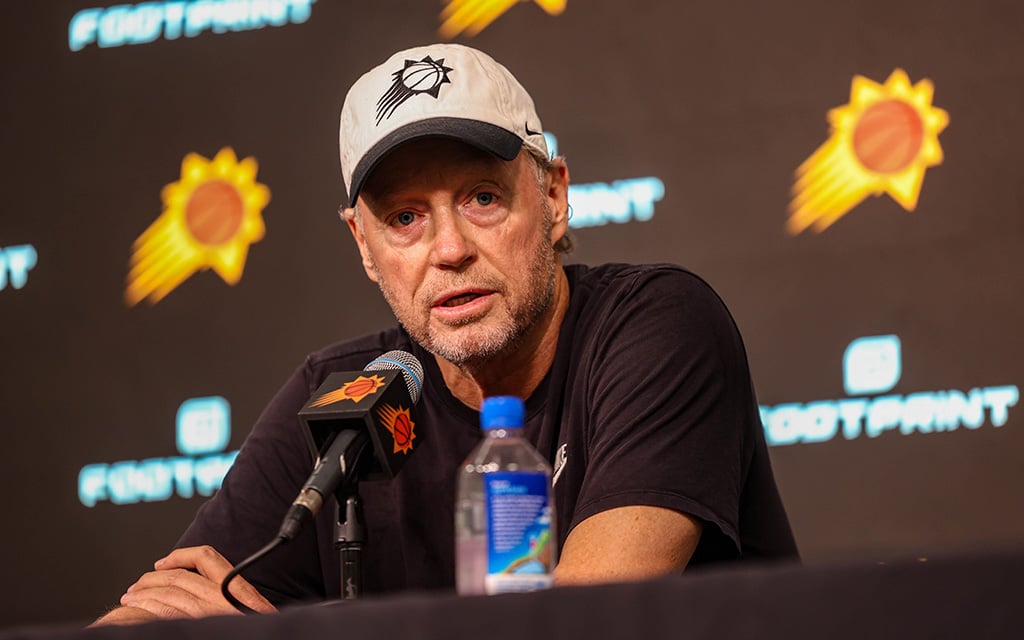PHOENIX – The Phoenix Suns currently rank first in total team payroll heading into the 2024-25 season, with three big names on their roster making a majority of that money. Over $150 million in payroll is dedicated to players who were acquired by trading draft picks and combining player salaries to acquire the already highly paid players.
Team-building philosophies vary from team to team. Some organizations have an owner who is willing to shell out any amount of money necessary to compete, such as Mat Ishbia and the Suns, as well as Wyc Grousbeck and the Boston Celtics, who are the reigning NBA champions and have a payroll of $199 million.
This trend may come to a halt, however, due to new rules put in place regarding “aprons” in the salary cap.
The first apron has been in place since 2011, implementing a penalty that teams faced for spending above the salary cap and luxury tax line. The penalty would restrict teams from acquiring a player in a trade if that player kept the team above the first apron line.
The second apron, new this season, implements new penalties that will handcuff violating teams from certain aspects of team building. If a team is over the second apron in salary, that team will be unable to trade some of their own picks in the future for win-now pieces.
The new second apron now puts more stress on drafting well, and the need to hit on the picks in order to fill out a roster becomes even more important.
Eric Pincus, a salary cap strategist and national NBA columnist for Bleacher Report, points out that every team operates differently and has their own method of conducting business.
“Each team is like its own country. It has its own culture,” Pincus said. “They do things the way they do things.”
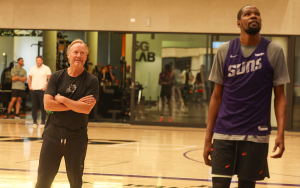
Suns coach Budenholzer faces the challenge of managing a roster impacted by the second apron, which restricts Phoenix’s ability to make certain in-season acquisitions. (Photo by Dylan Wickman/Cronkite News).
The Suns, along with the WNBA team Phoenix Mercury, were purchased in late 2022 by Mat Ishbia, CEO of United Wholesale Mortgage and a Michigan State University alum. Ishbia reportedly paid $2.28 billion for a 57% controlling interest in the club, which is valued at $4 billion.
“This is not just another NBA team,” Ishbia said at his introductory press conference in 2023. “This is the Phoenix Suns, the Phoenix Mercury. Great history, great tradition, great former players.”
Almost immediately after his introductory press conference in 2023, Ishbia and the Suns’ front office pulled the trigger on a trade for future Hall of Famer Kevin Durant, bringing him from the Brooklyn Nets to the Valley at the cost of multiple players and four first-round draft picks.
Trading future draft picks for “win-now” assets has been a trend around the league in recent years. Durant has been a top scorer in the league for many years and brings a great scoring element to Phoenix.
“The basis of the apron rules are the league is not telling you that you can’t keep your own players,” said Bobby Marks, a writer for ESPN and former assistant GM for the Brooklyn Nets. “What they’re telling you is that if you do keep your own players, that it’s going to be awfully restrictive as far as how you can add outside of your own group.”
The first apron is set at about $178.2 million, and the second apron is set at about $188.9 million. The apron levels will increase each year due to the growth of the salary cap.
For example, if Phoenix finished the 2024-25 regular season over the second apron, their 2032 first-round draft pick will be frozen, and unable to be dealt. However, if the Suns finish the 2025-26, 2026-27, and 2027-28 seasons under the second apron limit, their 2032 first-round pick would be unfrozen and the team could use it in a transaction.
There are more penalties than just the inability to move draft picks. If a team is over the second apron, it cannot sign a player using the tax mid-level exception, a provision allowing teams over the salary cap to add players.
An example would be the Denver Nuggets, who are below the second apron limit, signing Dario Saric by using the exception. Since the Nuggets used the exception, they aren’t allowed to exceed the second apron.
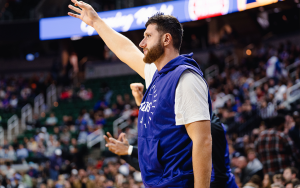
Phoenix Suns center Jusuf Nurkić is part of the team’s high-payroll strategy as the team ranks first heading into the 2024-25 season. (Photo by Brendon Pricco/Cronkite News)
“If you’re an apron team and you’re Phoenix, there’s no safety net for you,” Marks said. “You’re going to have to get lucky.
“They did a great job. They get Tyus Jones and they get Mason Plumlee and they get Monte Morris on minimum contracts. That’s a terrific offseason. But what’s going to happen is all three guys are probably going to play well, and they’re going to be free agents next year and they’re going to go sign somewhere else. Then you have to replace them with three guys on minimum contracts again.”
The Oklahoma City Thunder, one of Durant’s previous teams, have 13 first-round picks through the 2031 season, not including pick swaps. They were able to stockpile draft picks and draft well with those picks, including Jalen Williams who made NBA All-Rookie First-Team in 2023.
“You just keep on recycling your expensive contracts with younger players,” Marks said. “If you still have your draft picks and you’re not like Phoenix, you can keep on building up your roster.”
While they will have to pay up in future seasons to those players they drafted, they will have more than enough ammo to fill out the rest of their roster, while not being relegated to finding small-level contracts in free agency, such as the Suns did this past offseason signing Jones, Plumlee and Morris.
Within his first year as owner, Ishbia oversaw a complete overhaul of the Suns’ roster. Devin Booker is the only remaining player from the Suns team that reached the 2021 NBA Finals, where they lost to the Milwaukee Bucks.
One move included bringing in Bradley Beal in a trade with the Washington Wizards before the 2023-24 season. Phoenix shipped out five second-round picks, as well as multiple first-round pick-swaps. While this upcoming season is the first where the second apron is officially in effect, owners and front offices around the league knew the apron would be coming.
“The Suns knew the rules. The rules were established before they got Beal,” Pincus said. “It’s not like they did this and were like, ‘Oh, we were surprised by the rules. We’re going to still steer into this restrictive territory even further and lock in that restricted territory for at least a couple more years.’”
Another penalty for being over the second apron includes not being able to combine two salaries, and then trade the combined salary for a player who makes that same amount. For example, the Suns would not be able to trade Jusuf Nurkic and Grayson Allen for someone who makes their combined salary.
“That’s called aggregation when you combine the salaries of two players,” Pincus said. “If you’re above the second apron, you can’t aggregate.”
The second apron forces teams to look into the future, now more than ever, even with short-term transactions.
“It’s a puzzle that you have to manage over many years, for every team, for every market,” Pincus said.
This is yet another challenge that Ishbia and the Suns front office faces. With all of the money committed to the current team, they must navigate the present, while also keeping the future in mind.
“I’m not just a short-term thinker,” Ishbia said in his introductory press conference. “I’m a long-term thinker. I’m going to be here for 40, 50 years.”
Suns fans hope Ishbia keeps that mindset alive during his time as owner, as Phoenix searches for its first NBA championship. The new second apron makes it harder to trade assets to win now for current big spenders.
Ishbia must continue to put his business background to work. Whether it will translate to championships on the basketball court is yet to be seen.
“If you have these new owners come in and they have a billionaire’s background in business, one of the solutions in business is to throw money at a problem,” Pincus said. “And if you throw enough money at a problem, you can easily solve that problem.”
While Ishbia played basketball at Michigan State University, his strength is in business. He acknowledged at his introductory press conference that he wants to let people excel in their field.
“I think we got great people leading the Mercury organization, and great people leading the Suns organization, from a basketball perspective and from a business perspective,” Ishbia said. “Success is the key, money has always followed. Money follows success, not the other way around.”
